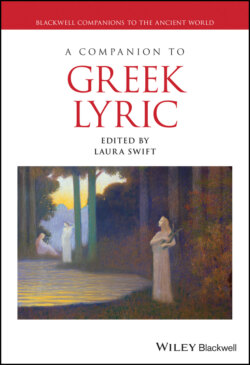Читать книгу A Companion to Greek Lyric - Группа авторов - Страница 26
Conclusion
ОглавлениеCan we pull the strings of what has been said together? The first thing is that religion encompassing the gods’ and humans’ place in the world,88 prayers to these gods, stories about them and their children, their worship in traditional places and ways, is ubiquitous in archaic Greek lyric. We must assume that belief corresponded to action: no prayer or sacrifice without belief in that deity, that is, in the deity’s power to harm or help. Gods must sanction poetry like anything else. Hence the desire to “begin with the gods” (ἄρχεσθαι θεοῦ) in any composition, either in the form of a prayer or a miniature hymn (Simonides Plataia).89 Here verse imitates ritual: the poem is offered, like a physical agalma, with a prayer at its head.90 The themes of heroic epic still play a large part, as we have seen, in lyric, either as a source of comparison (Telephos) or as a poetic material in its own right (Stesichorus). The gods have become more personal (Sappho) or politically engaged in stasis (Alkaios). Dionysos (Anakreon) and Aphrodite (Sappho again), whom we have not examined, dominate the world of the symposium, both of men and women. Pindar is exceptional both in the length of his compositions and his sophistication; Bacchylides equals his length but his compositions in the traditional fields of paian and dithyramb do not match Pindar’s semnotēs, elevation.91 These last two are the only true representatives of cult lyric, as their trained choruses performed at the great cult centers of Greece. As such they represented their city-states (Kowalzig) and performed with an agenda suiting both home city and place of performance (Lozynksi). It is vital to remember that all compositions we have been considering were meant for oral performance (Depew) before an audience whose constitution we can sometimes only guess at. Sappho’s works were “hits” still sung in later centuries.92 We must never forget, either, the agonistic quality of many Greek poems. Whether explicitly or not, the poet usually wanted to win, or win praise.
